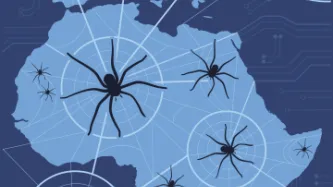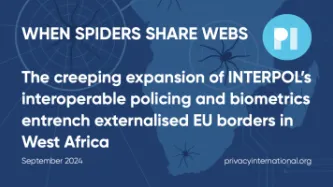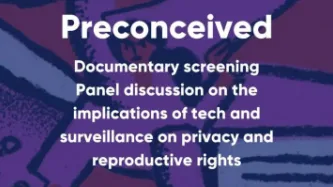Search
Content type: Long Read
INTRODUCTION
In recent years, major tech platforms have been rapidly evolving their business models. Despite their dominance in various markets, tech giants like Google and Meta are venturing into new territories to expand their user base. One of the most striking ventures has been their foray into the "connectivity market" through substantial, and occasionally unsuccessful, investments in network infrastructure.
Many tech companies are investing resources into network infrastructure, either…
Content type: Long Read
Our briefing, “When Spiders Share Webs: The creeping expansion of INTERPOL’s interoperable policing and biometrics entrench externalised EU borders in West Africa”, explores the concerning human rights implications of the use of interoperable data-driven policing capabilities and biometric technologies in West African countries rolled out by the International Criminal Police Organisation (INTERPOL)’s European Union (EU)-funded West African Police Information System (WAPIS) programme. We make a…
Content type: Legal Case Files
In September 2019, Privacy International filed 10 access to documents requests to EU bodies regarding the transfer of surveillance capabilities to non-EU countries. The requests seek documents providing information on the transfer of personal data, surveillance technology, training, financing, and legislation to non-EU countries. These are the disclosures so far from the DG International Cooperation and Development (DEVCO) – currently DG International Partnerships (INTPA).Following a…
Content type: Report
Content type: Long Read
The fourth edition of PI’s Guide to International Law and Surveillance provides the most hard-hitting past and recent results on international human rights law that reinforce the core human rights principles and standards on surveillance. We hope that it will continue helping researchers, activists, journalists, policymakers, and anyone else working on these issues.The new edition includes, among others, entries on (extra)territorial jurisdiction in surveillance, surveillance of public…
Content type: Report
First published in 2017, PI’s Guide to International Law and Surveillance is an attempt to collate relevant excerpts from these judgments and reports into a single principled guide that will be regularly updated. This is the fourth edition of the Guide. It has been updated it to reflect the most relevant legal developments until March 2024.The Guide aspires to be a handy reference tool for anyone engaging in campaigning, advocacy, and scholarly research, on these issues. The fourth…
Content type: Key Resources
Content type: Examples
The Australian Office of the Victorian Information Commissioner is investigating the University of Melbourne for violating privacy laws by using surveillance to identify students sitting in protest against the war in Gaza. Twenty-one student protesters have been served with "general misconduct" notices based on CCTV footage and records of their wifi use.https://www.middleeastmonitor.com/20240708-australia-university-under-probe-over-surveillance-of-pro-palestinian-protesters/Publication: Middle…
Content type: Examples
In June 2024 civil society called on the Kenyan government to ensure that the Internet remained accessible when outages coincided with ongoing protests and reports that security agencies are using technology to locate and abduct protesters.https://www.article19.org/resources/kenya-guarantee-internet-access-and-stop-surveillance-of-protesters/Publication: Article 19Writer: Article 19Publication date: 2024-06-28
Content type: Examples
In June 2024 Israeli authorities amped up its response to protests with more arrests, more violent arrests, and water cannons that have injured protesters, according to the legal aid organisation Otef Atsurim. Police have also been seen photographing cars, and some protesters say they have been followed home; others report that the police are taking action to prevent protests from starting. Public surveys show increasing fear of the police and rising belief that they have been politicised.…
Content type: Examples
A new report finds that unlawful police surveillance of peaceful protesters in the Netherlands is undermining the right to privacy and chilling protest, and violating both national laws and international human rights law. Police are frequently using their discretionary powers to demand to see ID cards, monitor social media, launch drones over protests, infiltrate group apps, and pay home visits without warning. When checked, IDs remain in a police database for five years. |Under the 2003…
Content type: Examples
Internal conflicts within Israel as the government undermined democracy by politicising the courts and the civil service offered Hamas the opportunity to mount the October 7 attacks. The government has also asked the security agency Shin Bet to use its tools to help deter the protest movement, but the Shin Bet chief has refused. https://www.haaretz.com/israel-news/2024-05-30/ty-article/.premium/israels-shin-bet-declined-to-step-up-surveillance-of-anti-netanyahu-protesters/0000018f-cab3-…
Content type: Examples
For months after February 2024, police in Atlanta, Georgia began conducting round-the-clock surveillance for months on people and homes linked to opposition to a 171-acre police training center under construction known as "cop city". Concentrated in 12 homes in four neighbourhoods, the surveillance has included following people in cars and disrupting lives by blasting sirens outside bedroom windows and shining headlights into houses at night. This type of physical surveillance has been known…
Content type: Examples
Following protests by residents of Dege county, government representatives visited homes in two villages due to be relocated to make way for the Kamtok hydropower dam. Cadres visited thousands of other villages looking for potential security risks and studying conflicts. Door-to-door visits collect information for the household information management system the Tibet Autonomous Region set up in 2023, but may also conduct interrogations to extract individual views of the Chinese Communist Party…
Content type: Examples
Israel has conducted a decade-long secret attack on the International Criminal Court that allegedly included the use of its intelligence agencies to hack, surveil, pressure, smear, and threaten senior ICC staff in order to interfere with the court's inquiries. Israel has denied the allegations. In May 2024 the ICC's chief prosecutor announced he would seek arrest warrants against both Israeli and Hamas leaders. Israel's actions against the court began in 2015, when Palestine was recognised as a…
Content type: Examples
In May 2024 three men were charged in London with gathering intelligence for Hong Kong and forcing entry into a residence in Britain. One of them was found soon afterwards dead in a park while out on bail. The arrests raised awareness of the concerns of Hong Kong activists who have moved to London but find that they are still under surveillance from China. For some, Hong Kong authorities have offered a $128,000 bounty for information leading to their arrest. https://www.nytimes.com/2024/05…
Content type: Examples
Eighteen hours after Columbia University's Hamilton Hall students occupied a building as part of a pro-Palestine protest, police moved in, arrested dozens of people on charges of burglary and trespassing, and removed the encampments. The administration gave the students, whose primary demand was that the university divest from companies supporting Israel's government and military, ten minutes to agree to leave immediately in return for the university's promise to review their divestment…
Content type: Examples
Facial recognition is changing the nature of protest, as participants wear keffiyehs and face masks in order to hide their identities from the video cameras ubiquitous on university campuses. Student protesters have long asked schools not to use facial recognition on campus because of the damage being identified can do to those who are caught by it, even if they are misidentified or the protests were peaceful. This is especially in cases where the university calls in local law enforcement to…
Content type: Examples
In moves compared to the McCarthy era of "reds under the bed" censorship, US counter-terrorism authorities often investigate political speech at borders and elsewhere. Both major political parties have a long history of conflating activism in favour of Palestinian rights with terrorism. https://www.theguardian.com/commentisfree/article/2024/may/22/surveillance-pro-palestine-protestPublication: The GuardianWriter: Chip GibbonsPublication date: 2024-05-22
Content type: Examples
Workers at a St Peters, Missouri Amazon warehouse have filed an unfair labour practice charge with the US National Labor Relations Board alleging that Amazon has interfered with employees' right to unionise by intrusively surveilling them. Constant video and audio recording analysed by AI enables the company to discipline hundreds of thousands of workers and making it hard for them to talk to each other about working conditions, injuries, and other issues. In Europe, more than 20 labour…
Content type: Examples
Documents released under the Connecticut Freedom of Information Act show that as pro-Palestine protests have escalated, Yale has in tandem increased its tactics for monitoring student dissent. Among them: the police have surveilled student social media accounts, sent administrators to rallies, and the university has coordinated with local and state law enforcement. Forty-seven students were arrested in April 2024, and Yale has been caught in Congressional investigations into antisemitism…
Content type: Examples
An international student in Sydney, Australia, who has participated in demonstrations criticising the Chinese Community Party reports that his parents in China have been threatened by police and that the social media accounts he uses to communicate with friends and family back home have been abruptly banned. Amnesty International finds that this transnational repression is part of a pattern that spans Europe, the US, and Canada. A Chinese Foreign Ministry spokesman calls the Amnesty report "…
Content type: Examples
After the US Supreme Court's Dobbs decision overturning Roe v Wade leaked in 2022, the social media monitoring company Dataminr sent regular alerts to the US Marshals Service with times and places of pending pro-choice protests and rallies and many other protests. As a partner of Twitter, Dataminr has full access to its firehouse of postings. Among those sent to the Marshals are many innocuous postings that are clearly protected by the First Amendment. Both Twitter and Dataminr deny that…
Content type: Examples
Analysis of 700,000 documents obtained in a public records lawsuit show that the Washington, DC Metropolitan Police Department in collaboration with federal law enforcement characterised racial justice protesters and activists in 2020 and 2021 as threats based on information gathered from social media platforms and mass email chains. Widescale monitoring of social media blurs the line between monitoring for genuine public safety threats and scrutinising speech and assembly rights protected…
Content type: Examples
US states are turning to obscure laws banning masks in public, typically passed in the 1940s and 1950s in response to the rise of the Ku Klux Klan, to target people wearing face coverings while protesting the war in Gaza. In Ohio, the attorney general warned the state's 14 public universities that protesters wearing masks could be charged with a felony, in North Carolina arrested student protesters were charged with wearing masks in public, and the University of Texas at Austin withdrew…
Content type: Examples
A new report finds that Chinese and Hong Kong authorities are retaliating against Chinese student activists in Europe and North America in numerous ways: they are being surveilled both online and offline, and their families in China are being threatened by local police. The 32 students interviewed say that as a result they are afraid on their university campuses, spread across eight countries. Amnesty International calls these efforts "a strategy to curb students' human rights wherever…
Content type: Examples
Police set up cameras pointing directly at the pro-Palestine encampment at the University of Toronto's King's College Circle, leading protesters to claim they are solely for the purpose of monitoring them. Both police and the university denied that new surveillance had been put in placce.https://toronto.citynews.ca/2024/05/11/u-of-t-encampment-organizers-raise-concerns-about-illegal-surveillance/Publication: Toronto City NewsWriter: Tina Yazdani and John MarchesanPublication date: 2024-05-11
Content type: Examples
In the controversy-filled leadup to the Eurovision final, Swedish authorities set up one of the country's largest-ever security efforts. They constructed a fence around the Malmö Arena and sent up drones to patrol the city with cameras. Police, who usually carry handguns, were equipped with heavier weapons, and the arena banned bags and Palestinian symbols and required airport-style security gates, scanners, and searches. https://metro.co.uk/2024/05/08/eurovision-tensions-hit-fever-pitch-…





